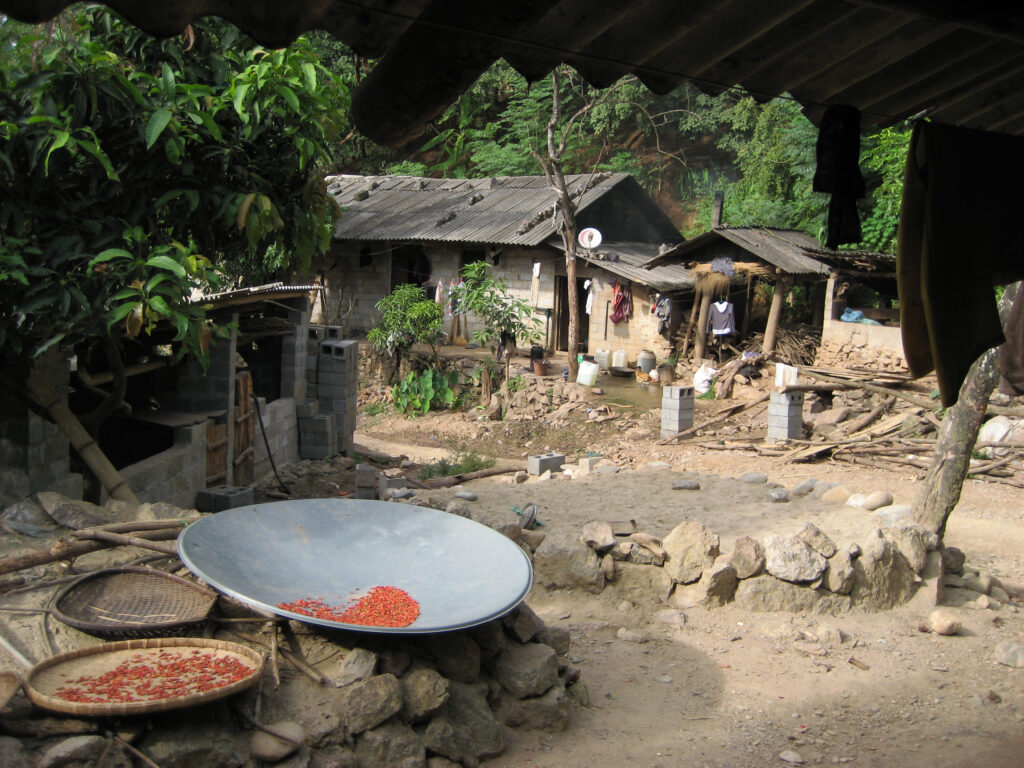He came and took the scroll from the right hand of him who sat on the throne. And when he had taken it, the four living creatures and the twenty-four elders fell down before the Lamb. Each one had a harp and they were holding golden bowls full of incense, which are the prayers of the saints. And they sang a new song:
‘You are worthy to take the scroll
and to open its seals,
because you were slain,and with your blood you purchased men for God
from every tribe and language and people and nation.
You have made them to be a kingdom and priests to serve our God,
and they will reign on the earth.’
Then I looked and heard the voice of many angels, numbering thousands upon thousands, and ten thousand times ten thousand. They encircled the throne and the living creatures and the elders. In a loud voice they sang:
‘Worthy is the Lamb, who was slain,
Rev 5:7-12
to receive power and wealth and wisdom and strength
and honor and glory and praise!’
The Mosuo people have lived for centuries by the pristine, crystal-clear waters of Lu Gu Lake. It took the driver of the small van we rented ten hours to navigate the bumpy and treacherous mountain roads that bind Lu Gu Lake to the town where we had stayed. When we arrived, we were immediately struck by the beauty of the area and the Mosuo villages, both relatively untouched by modern development. One of the Mosuo houses we visited was over 400 years old, and yet the inhabitants indicated that they had only received electricity the previous year.
In spite of the beauty of their land, the Mosuo have significant spiritual and social needs. One village we visited was 20 kilometers from the nearest doctor. Educational opportunities are also very limited: the local primary school has a 30–40 per cent dropout rate because the students must travel so far.
Mosuo society is matriarchal, and this distinctive feature of their culture was very evident. When we ate lunch in one home, the great grandmother, grandmother, mother and daughter – four generations of women – were all present, but no men were to be found. In fact, I was told that the Mosuo language does not even have a word for ‘father’. Marriage customs are also lax. Most Mosuo do not marry until after their first child is born.
A 16-year-old young man named Er Qi helped paddle us across a portion of Lu Gu Lake in a canoe hewn out of a single, large log. With a mischievous grin, Er Qi noted that he was free to have many ‘girlfriends’. I told Er Qi that I was a Christian and that we Christians only have one wife. Nodding to my wife, I emphasized that I was very satisfied with one wife. This led to a discussion of Christianity. Er Qi’s first comment was: ‘You Christians don’t eat and then die, right?’ Obviously there were some misconceptions to dispel and a lot of ground to cover.
As I shared the gospel with Er Qi, things got really interesting. Mosuo religious beliefs have been largely shaped by Tibetan Buddhism and related forms of spiritism. There are no Christian churches among the Mosuo and they are considered unreached. So, when Er Qi mentioned that he knew two Mosuo Christians, I was very surprised. Two years ago, he said, there was a Mosuo couple that became followers of Christ. However, they were arrested by the local police and sent to prison. Er Qi clearly felt the couple had been arrested because they were Christians.
When I heard these words I could not help but think of all the obstacles which kept the Mosuo from hearing and responding to the gospel – their isolation, their spiritism, the government restrictions – the difficulties seemed so large. But then I thought of some of the other minority groups and what God had done in their midst. I was reminded afresh of God’s power to transform lives and to break through seemingly insurmountable obstacles. I began to pray that God would send missionaries to the Mosuo.
This experience took place about 25 years ago. Shortly afterwards several Chinese friends travelled to the area and shared the gospel with the Mosuo. I was very excited to learn that as a result of their ministry, several Mosuo became followers of Jesus.
Lord, you alone are worthy of my worship. I praise you because with your blood you have ‘purchased’, you have redeemed, people from every tribe and every language and every nation, men and women from every people group, including the Mosuo. I marvel at your awesome power and the depth of your love. I rejoice because even now you are reaching out, breaking through every conceivable barrier, and calling people from previously unreached groups to worship you. Lord, I pray that you would bless these new Mosuo believers and those that minister among this group. Help them demonstrate your love and righteousness in such a way that many others would follow in their footsteps. Empower their witness. Stretch out your hand and perform signs and wonders in their midst. I pray that a revival would stir this people and bring transformation. Lord, I also acknowledge that although you delight to use me, sometimes I have been slow to hear your voice and slow to obey. Oh, Lord, help me see the world and its needs as you see them. Enable me to respond as I should. Use me, Lord, use me!


